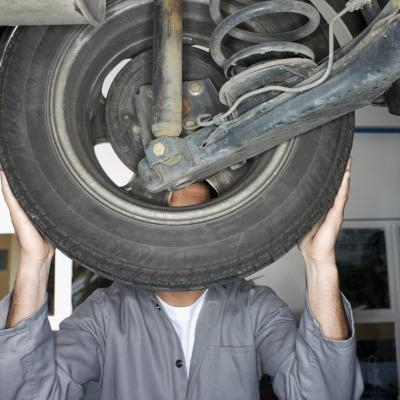
A VW Jetta's wheel bearing is an extremely important aspect of the suspension. The wheel bearing supports the weight of the car on the suspension and allows the wheels to spin freely. If a wheel bearing fails, the results can be catastrophic, since the wheel will no longer be supported in its proper orientation. There are several symptoms of bad wheel bearings. If you suspect your Jetta's wheel bearings are bad, they should be replaced by a mechanic.
Listen for rumbling or clicking from the wheel. Wheel bearings are constructed of a series of bearings that are sealed inside of a metal housing and packed with grease. If the grease become contaminated with dirt or somehow comes out of the housing, the bearings will begin to make noise when the vehicle is being driven. The noise may become more pronounced when the vehicle is driven around corners and there is extra force acting on the bearing.
Test drive the vehicle and see how the suspension and steering feel. A badly worn wheel bearing will cause the suspension and steering to be more vague than normal as the wheel is allowed to move excessively around the wheel bearing. The suspension may feel darty or wander back and forth, particularly at higher speeds.
Check for excess free play from the wheel. Place a floor jack under the Jetta at the appropriate jacking point (this varies depending on the generation of Jetta) and lift the car. Support it with a floor jack for added safety. Place a hand on either side of the tire and try to rock the wheel and tire back and forth on the hub. There should be no movement. If there is any play or slop in the wheel and tire when you do this, the wheel bearings are likely bad and will need to be replaced.